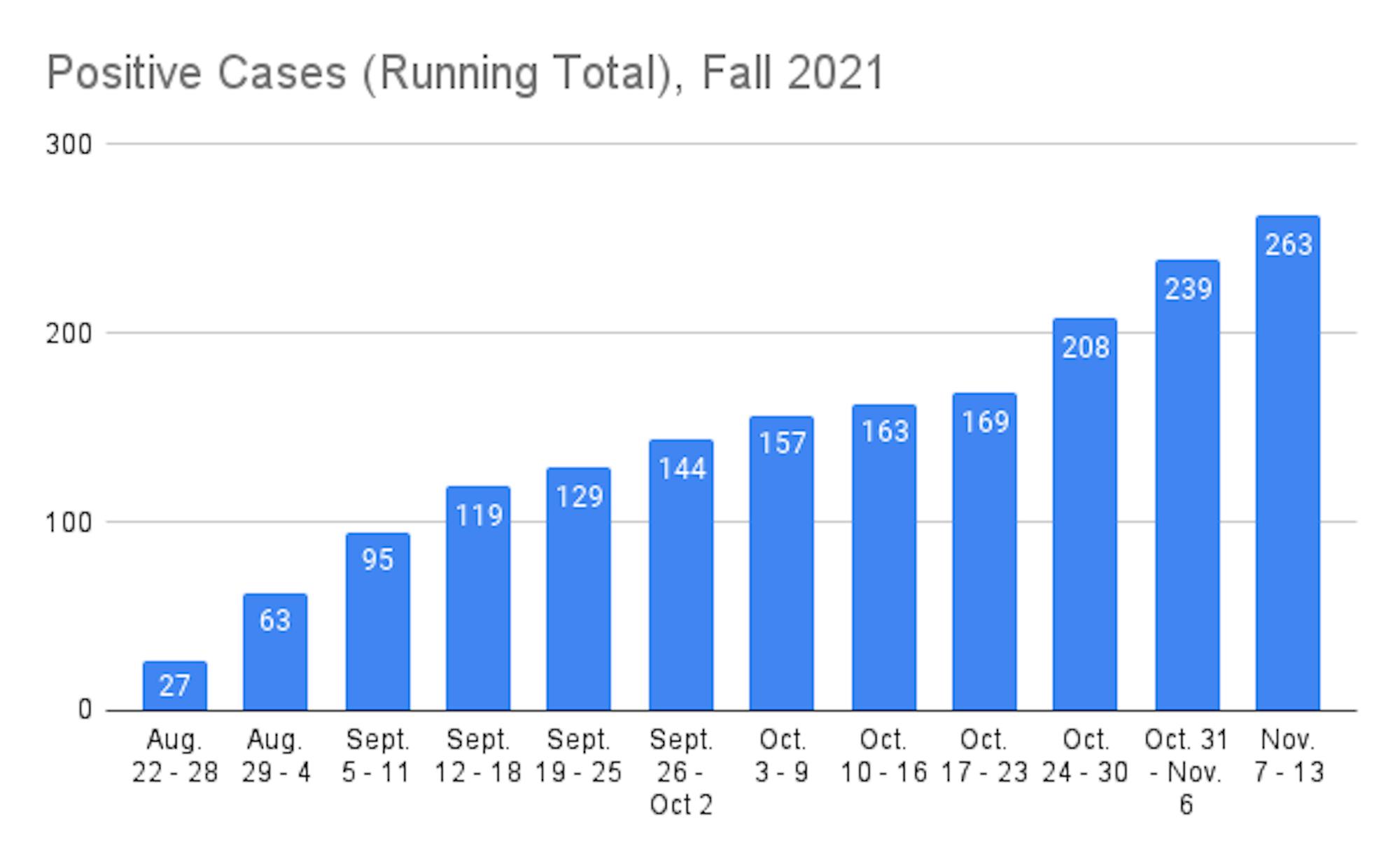In August 2020, Notre Dame reopened its campus for the fall 2020 semester in the middle of the COVID-19 pandemic. Since then, community members have come together for three semesters to face common adversities presented by COVID.
While the 2020-21 school year was filled with challenges caused by the pandemic — including surveillance testing, student quarantine and isolation and rising case numbers — the 2021-22 school year has brought about a more stable status quo for the community. Most social events have resumed and, compared to the end of the 2020 fall semester, the Notre Dame community has substantially lower COVID-19 case numbers.
At the end of the fall 2020 semester, the running total of positive cases was 1,890. This number was similarly high at the end of the spring 2021 semester at 1,516 cases.
Dr. Edward Junkins, director of University Health Services (UHS), said the unique challenges brought about by the pandemic over the past year and a half have been felt on many levels.
“In addition to creating public health policy based on rapidly evolving science, Notre Dame is also responsible for maintaining campus safety, communicating accurate and timely information, and remaining mindful that the virus was both contributing to and diminishing our overall physical and mental health,” he said.
As of Nov. 13, the running total of positive cases on campus has accumulated to 263. At approximately this time a year ago, this number was at 1,618. Junkins noted the significant difference in the number of positive cases this fall compared to last fall.
“[The positive cases] ultimately translated into hundreds of students in quarantine and isolation at any particular time throughout the semester,” he said. “By comparison, this year, Notre Dame has only needed to house fewer than three dozen students in quarantine and isolation at any one time.”
Dr. Alex Perkins, Notre Dame biology professor and Eck Institute for Global Health faculty member, cited vaccination as a critical factor in the decrease of positive cases on campus.
“Knowing the high efficacy of the vaccine, when nearly everyone is vaccinated, what we would expect to see is dramatic reduction,” he said. “The students who were infected at one point last year, which must apply to a pretty large proportion of campus, went on to get vaccinated as well. This would mean natural immunity in addition to the vaccines which is probably even more powerful.”
Junkins also emphasized the significance of vaccination, explaining that it was “critical in the local, national and global fight against COVID-19”.
“When a community is uniformly, highly vaccinated, the rapid spread of the COVID virus is extremely unlikely,” he said. “Notre Dame was fortunate to have both our own vaccination center on campus last spring and enough vaccines to immunize all students — undergraduate, graduate and professional.”
Junkins added that Notre Dame’s high vaccination rates allowed the campus to start the fall 2021 semester without the stricter restrictions that were in effect last year.
“Without the collective concern for our community’s health and well-being and the willingness of students, faculty and staff to comply with the University’s COVID-19 vaccination requirement, we simply would not be able to enjoy so many of the pre-pandemic practices and University traditions we are experiencing now,” he said.
While the Univresity’s COVID dashboard displays much lower numbers of positive cases, many of these can be attributed to “breakthrough cases.” Perkins addressed these cases, explaining that understanding them starts with comprehending how immunity works.
“When you’re vaccinated, your body is basically primed and prepared to fight the virus much sooner than it would be if it hadn’t encountered it before,” Perkins said. “That’s the implication. But as soon as the virus shows up in your body, your immune system won’t immediately fight it off. Someone who is vaccinated or had it in the past will simply be able to fight it off much more quickly.”
He added that, while breakthrough cases are rare, they are to be expected.
“From a health standpoint, they are not a huge worry,” he said. “Occurrence of hospitalization and death among those who are vaccinated are very low, in comparison to those who aren’t.”
Junkins spoke on what is to come for UHS leadership and the campus community as a whole. He said that Notre Dame will continue close tracking, particularly with the winter months coming up.
“The daily caseload will be closely monitored for any upward trends, and outbreaks within groups or locations on campus will be closely tracked. Additionally, the unvaccinated population on campus will continue to be closely monitored on a weekly basis,” he said. “To date, this group of individuals continues to have an extremely low test probability positivity rate. All of this suggests that the prevalence of the virus remains quite low on the Notre Dame campus.”
Perkins agreed that it is important that Notre Dame continues to monitor the pandemic.
“We can probably expect the coronavirus to hang around indefinitely,” he said. “It will continue to fluctuate, and we are likely approaching something of a new normal.”
Another factor to be mindful of is the emergence of new variants over the past few months, Perkins said, adding that “if you feel ill or have tested positive, even if you are vaccinated, it would be a good idea to try to isolate yourself.”
Students may refer to the UHS websitefor additional information on COVID-19.













